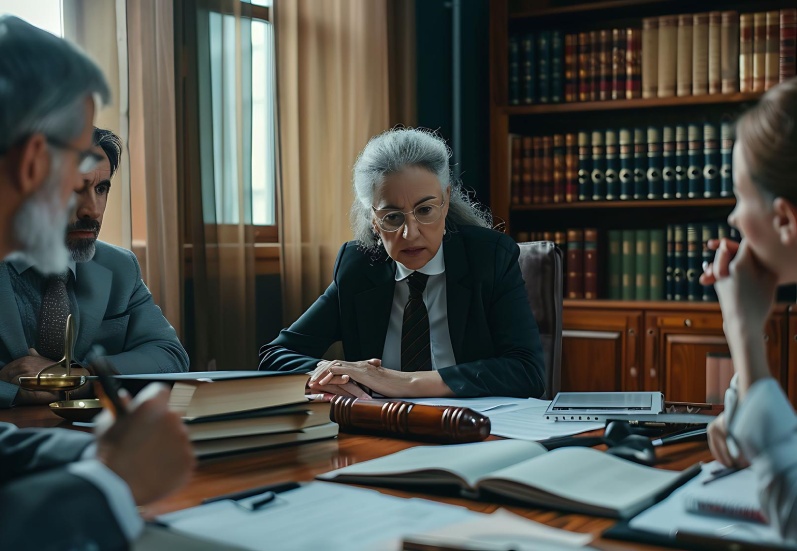
Dealing with the complexities of ageing can be challenging, and navigating through legal matters is often overwhelming for seniors and their families. An Elder Law Attorney specializes in addressing these unique issues, ensuring that seniors have the legal protection and support they need.
Our expertise in elder law includes handling important legal documents such as wills, trusts, and powers of attorney, as well as providing peace of mind to our clients and their loved ones.
We understand the importance of comprehensive planning for the future. Whether it’s long-term care planning, opting for pooled trust for Medicaid applications, or safeguarding assets, an Elder Law Attorney offers tailored solutions
In our fast-paced world, having a dedicated legal professional focused on Elder Law can make all the difference.
By addressing the specific needs and concerns of seniors, we help families navigate through complicated legal landscapes with confidence and clarity. learn more about skilled elder law attorney
Understanding Elder Law

First, let us talk about who or what an elder law attorney is.
Elder Law focuses on addressing the unique needs of older adults, such as estate planning, guardianship, and special needs law. Choosing an appropriate attorney and understanding certifications can help ensure that seniors receive the proper legal support.
Elder Law encompasses a variety of areas that are essential for the aging population. Estate planning is a critical aspect that involves creating wills, trusts, and advanced directives to manage assets and healthcare decisions.
Additionally, guardianship services may be necessary when an individual is no longer capable of making their own decisions due to cognitive decline or physical incapacitation.
Furthermore, attorneys specializing in Elder Law often also cover Medicare, Medicaid planning, and long-term care issues. Legal guidance in these areas ensures that elderly clients and their families are financially and legally protected.
Finding the Right One: How to Choose the Right Elder Law Attorney?

Selecting an appropriate elder law lawyer is essential to guarantee the care and welfare of your loved one in the future.
Begin by requesting recommendations from reliable people, such as friends, relatives, or medical experts. Look for elder law attorneys with expertise in Medicaid planning, estate preparation, and guardianship.
First and foremost, take their availability and communication style into account when choosing a lawyer. Make sure they are reachable for inquiries and issues and that they convey intricate legal ideas in an understandable manner.
Additionally, verify their credentials as well, looking for things like National Academy of Elder Law Attorneys (NAELA) membership.
It’s critical to talk about costs and invoicing procedures upfront. For example, some lawyers bill on an hourly basis, while others have fixed rates or package discounts. Extremely low prices should be avoided as they may jeopardize the quality of the service.
Finally, follow your gut. Select a lawyer who has compassion and actually cares about your loved one’s welfare. You may choose the best elder law attorney to help you navigate the intricate process of making plans for your loved one’s future by taking these criteria into account.
Certifications in Elder Law
Certifications provide added assurance of an attorney’s proficiency in Elder Law.
The National Elder Law Foundation (NELF) offers the Certified Elder Law Attorney (CELA) credential. This certification is a mark of excellence and confirms that the attorney has met stringent criteria, including passing an examination and having substantial experience.
Additionally, attorneys with the CELA designation are equipped to handle complex legal issues related to aging, such as housing, healthcare, and financial needs. It’s a certification that reflects dedication to this specialized field and signifies a commitment to ongoing education and ethical practice.
Planning for the Future

“When should I hire an elder law attorney?” This is a question that a lot of people often think of. The answer to this is when you are planning.
Planning for the future is crucial for ensuring the financial security and well-being of our loved ones. It involves not only managing assets but also making informed decisions regarding healthcare and legal protections.
Estate Planning Essentials
Firstly, estate planning is fundamental for managing and distributing our assets after we pass away. This includes creating wills to outline how our belongings will be divided and establishing trusts to manage and protect assets efficiently. An estate plan may involve probate to validate our will and transfer ownership.
Creating a Durable Power of Attorney allows someone we trust to manage our financial affairs if we become incapacitated. Additionally, a Health Care Power of Attorney designates someone to make healthcare decisions on our behalf. A Living Will provides instructions on medical treatments we wish to receive or refuse at the end of life. These documents ensure our wishes are respected and minimize the burden on our families.
Long-Term Care and Medicaid
Secondly, long-term care planning is essential as we age, particularly with increasing life expectancies and rising healthcare costs.
Medicaid Planning helps to protect our assets while ensuring we meet the eligibility requirements for public benefits. This may involve structuring asset transfers and setting up trusts that comply with Medicaid rules.
Long-term care insurance can cover the costs of nursing homes and in-home care, reducing the financial strain on our families.
Additionally, planning for special needs provides for family members with disabilities, ensuring they remain eligible for public benefits without jeopardizing their financial security.
Furthermore, proper asset protection strategies, including irrevocable trusts, ensure that our resources are preserved for future care needs.
Legal Protections and Healthcare
Legal protections in elder law safeguard us from elder abuse and financial exploitation. A well-drafted Durable Power of Attorney and Health Care Power of Attorney can prevent unauthorized individuals from making decisions on our behalf.
Supported decision-making agreements offer alternatives to guardianship by allowing us to retain autonomy while receiving assistance from a trusted individual.
Healthcare considerations include managing Medicare and other public benefits to cover medical expenses, especially in cases of dementia or chronic illness.
End-of-life planning ensures our healthcare preferences are followed and relieves our family members from making difficult decisions. We should regularly review our plans to account for changes in laws and personal circumstances.
By addressing these essential areas, we can secure our future and protect our interests, providing peace of mind for ourselves and our families.
Bottom Line
In conclusion, it doesn’t have to be difficult to deal with the complicated world of elder legal matters.
To guarantee that your loved one’s future is safe, an elder law attorney offers knowledgeable counsel and assistance. They assist you in making well-informed decisions about guardianship, estate planning, and Medicaid planning.
Elder law attorneys reduce anxiety and offer peace of mind with their specific expertise and caring demeanor. They support you in defending the possessions, honor, and well-being of your loved one.
To make sure your loved one gets the attention and assistance they need, seek the advice of an elder law attorney. You’ll be giving them the gift of a safe and comfortable future by doing this.
Additional Reading:
- Financial Crime Lawyer: I Bet You Didn’t Know THIS
- Unlocking Opportunities: Employment Immigration in Illinois
- Justice in the Balance: The Role of Criminal Defense Attorneys

![Why Are People Searching For A Roblox Lawsuit Lawyer At Dolman Law? [Complete Guide]](https://lawyersinventory.com/wp-content/uploads/2026/02/roblox-lawyer-dolmanlaw.com-roblox-lawsuit-100x100.png)









0 Reply
No comments yet.